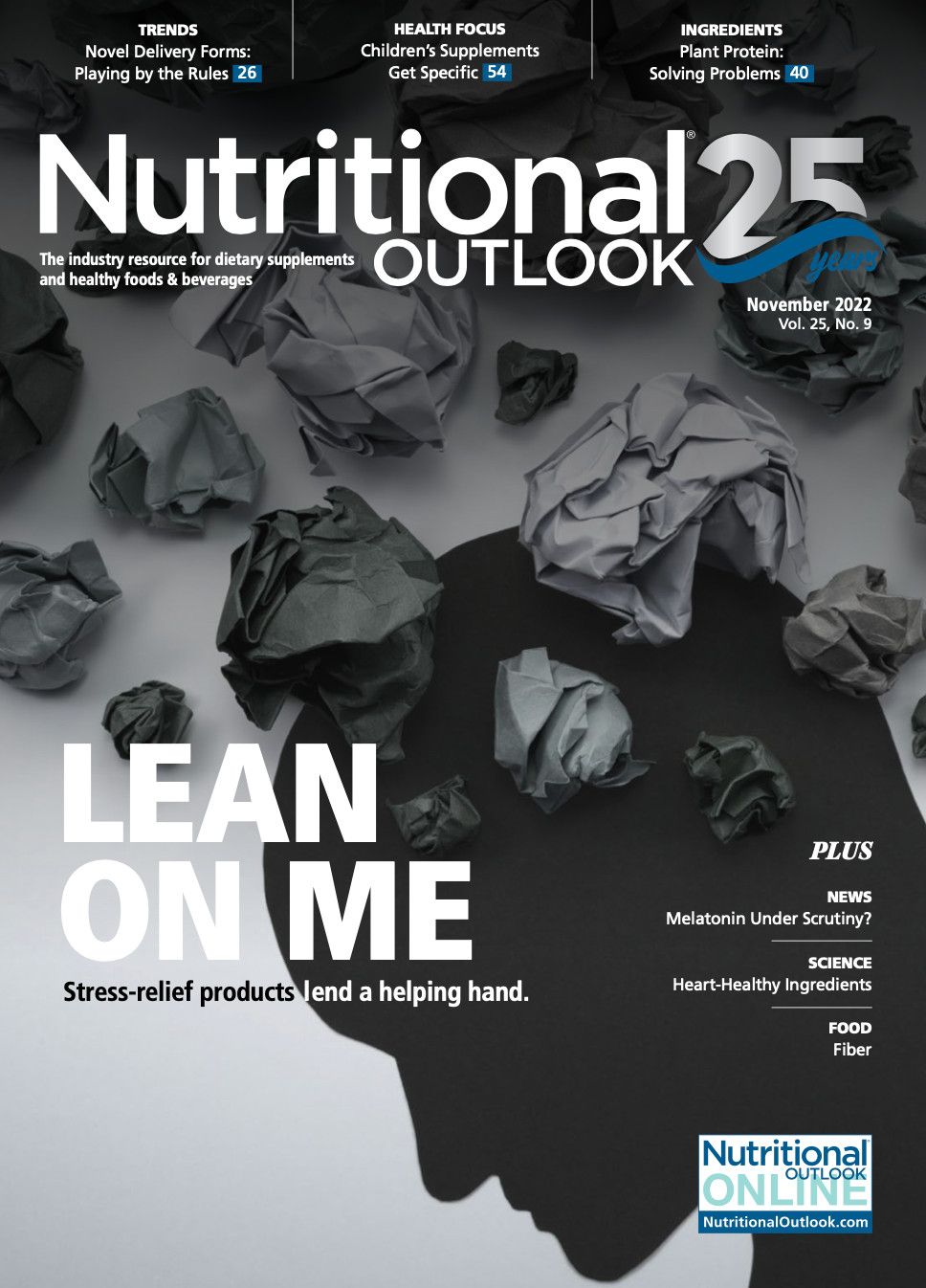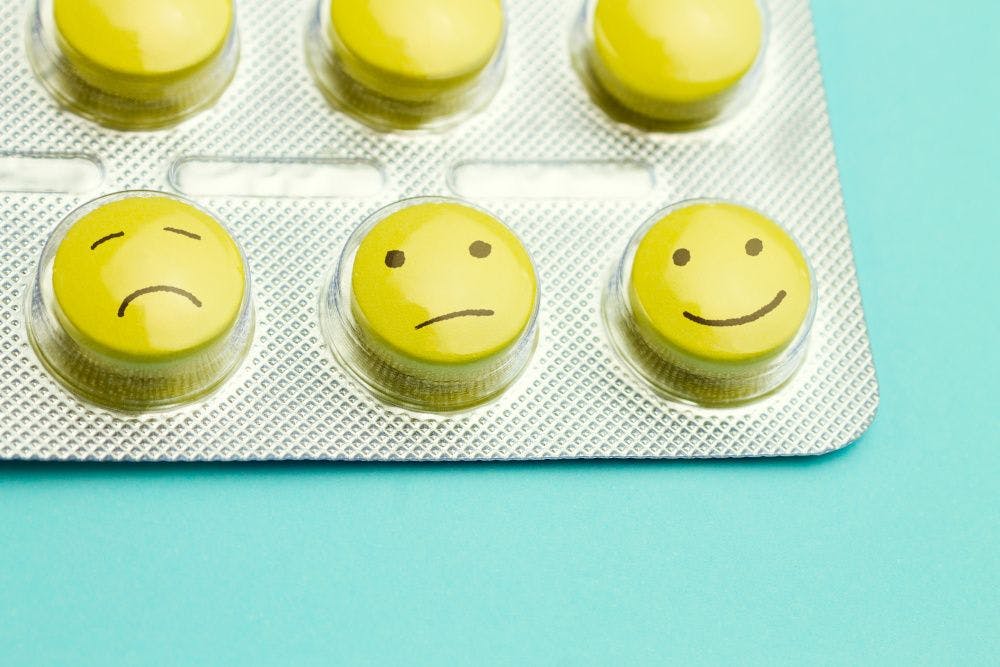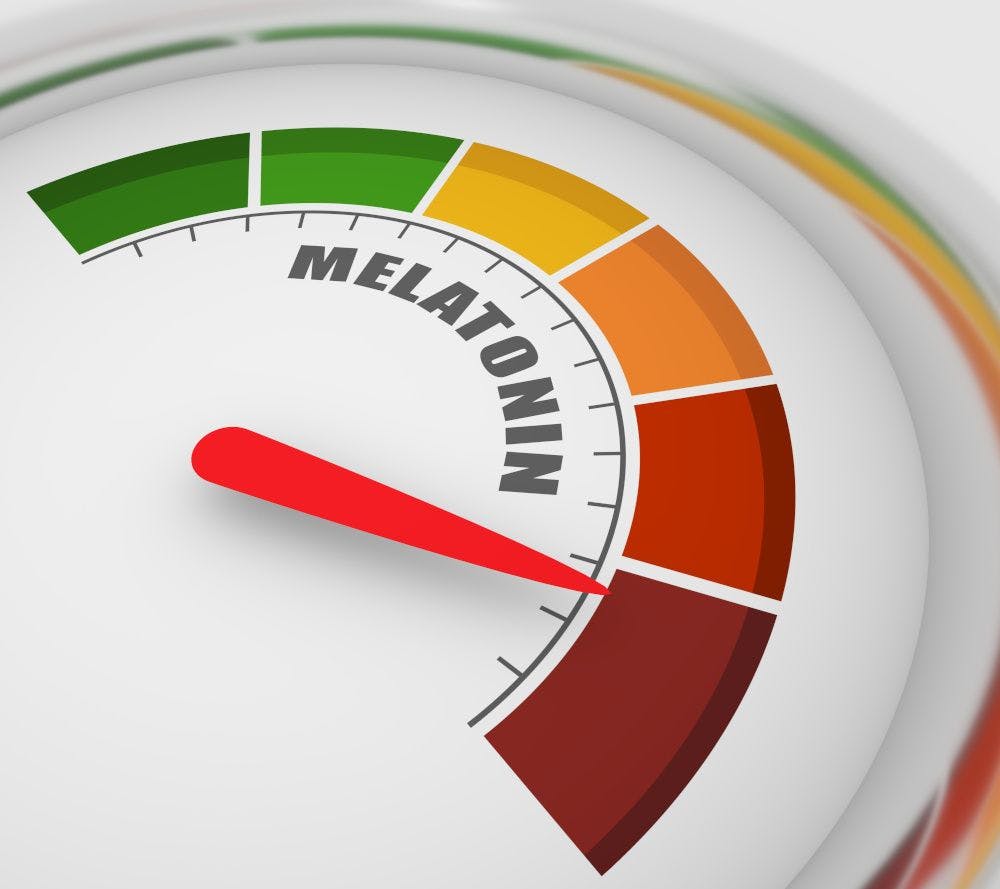Stressing the positive: Supplements and functional foods help consumers keep their cool
Brand leaders in the supplements and foods space explain how they are delivering products to de-stress—and delight—their customers.
Photo © Tadamichi - Stock.adobe.com

“Stress eating”: It’s one of those coinages that the pandemic put into wider currency as consumers leaned full-throttle into comfort foods in a bid to ease uncomfortable emotions during lockdown’s depths.
And even as COVID-19 retreats, rising inflation, geopolitical strife, and climate change’s existential threat—to name a few current stressors—keep emotionally driven eating high on our list of strategies for getting through the day.
Yet if consumers really want to leverage nutrition in the service of soothing jangled nerves, they’d be wiser to jettison the brownies and ice cream in favor of more genuinely fortifying choices.
And to hear Charlotte Traas tell it, many of them are.
“With the increased emphasis on self-care,” says the director of education for New Chapter (Brattleboro, VT), “consumers are managing stress by improving their holistic health inclusive of diet, exercise, sleep, meditation, hydration, and supplementation. So while stress isn’t a new phenomenon, how we manage it—and the product solutions consumers turn to—are.”
Stuck in Survival
“Life has always been stressful,” Traas concedes. “But the events of the past two years have had a more profound impact on Americans than usual.”
She cites results from the American Psychological Association’s most recent Stress in America survey showing that 63% of respondents feel the pandemic has forever changed their lives.
What’s more, adds Brittany Michels, MS, RDN, LDN, CPT, a dietician for The Vitamin Shoppe (Secaucus, NJ), “Participants in the survey admitted to drinking more alcohol and experiencing undesired weight gain.”
Alas, nearly three years post-pandemic, new concerns are “piling even more upon a nation ‘stuck in survival mode,’” Traas laments. The economy, supply-chain issues, Russia’s invasion of Ukraine, and the fear of retaliation—nuclear, cyber, or otherwise—all take their toll, she says.
And the consequences extend beyond the individual. Stress costs American businesses an estimated $300 billion annually and has helped fuel “The Great Resignation,” claims Rachel Yarcony, founder and CEO, myAir (Boston). In fact, a recent Society for Human Resource Management study found that 83% of U.S. employees suffer from chronic stress, “with 60% complaining that their companies don’t provide tools for coping,” Yarcony says.
Striking a Balance
Those tools are critical, for even prior to the pandemic, the World Health Organization pegged stress as the global health epidemic of the 21st century, Yarcony notes, “and it can now be linked to the sixth-leading cause of death in the world.”
But the relationship between stress and health, as she puts it, is “tricky.”
Susan Hazels Mitmesser, PhD, vice president, science and technology, Pharmavite (West Hills, CA), would agree. “One of the most misunderstood facets of stress is that it’s not all negative,” she notes. Acute stress “can actually have a positive impact, helping motivate you in tasks like organizing and planning,” she says. “It’s when there’s too much stress, or too lengthy an exposure, that issues arise.”
Such issues range from fatigue, depression, and anger to poor sleep, chest pains, compromised immunity, metabolic disorders, and an overreliance on tobacco, alcohol, and—you guessed it—unhealthy foods.
Brain and Body
Which goes to show: Stress is not all in your head.
“Stress’s effects prove so pervasive,” Traas explains, “because the body reacts by releasing hormones that flood the brain and other systems. This stimulates respiration, adrenal responses, sweat glands, and blood pressure.”
Cortisol—colloquially known as “the stress hormone”—is one of those hormones, she adds, and in a body facing chronic stress, cortisol’s continual release “creates a state of hyperarousal that can affect the brain, nervous system, and inflammatory response. The body becomes like an engine that’s been worked too hard and too long—and it can feel exhausting.”
Feeding the Fire
While our bodies have “the exceptional ability to handle stress in small doses,” Michels points out, “they aren’t as good at managing long-term or chronic stress. And today’s flavor of stress is long-term and chronic.”
She should know. “As a holistic professional,” Michels says, “I help clients identify root stressors and implement realistic supportive actions every day.”
Key among the actions she suggests for her clients are nutritional interventions; and yet even here, “the relationship between nutrition and stress is complicated,” Michels admits. Not only can stress bias us toward “hasty, not-so-healthy dietary decisions,” she says; stress also shapes how our bodies make use of the foods we do eat.
And it all starts in the gut. Consider that stress can affect how quickly food moves through the gastrointestinal tract, altering the body’s digestion and absorption of nutrients. “And a digestive tract that moves sluggishly increases exposure to toxins that the body should eliminate,” Michels says, “while one that moves too quickly decreases nutrient absorption.”
Gut-Brain Pathway
Operating at a more granular level is the hypothalamic-pituitary-adrenal axis, or HPA, which is a part of the nervous system linked to the stress response as well as a gut-brain communication pathway that helps control both neurotransmitter production and the microbiome.
And as Kimberly Kawa, natural-industry insights specialist, explains, when the HPA axis is chronically activated, the immune system upregulates inflammation and the production of cytokines, increasing gut permeability, triggering downstream immune effects, and letting some of the trillions of bacteria that inhabit the gut—and that may play a role in regulating mood—escape into the body at large.
This stress-induced bacterial exodus is no small matter considering that the receptors for GABA—the “calming neurotransmitter,” as Kawa calls it—and for serotonin—“sometimes referred to as the ‘happiness hormone,’” she adds—rely on a balanced microbiome for their proper function.
Adding insult to injury, Kawa continues, “Diets high in sugar and unhealthy fats and low in fiber don’t support the body’s gut barrier or healthy bacterial diversity, either.”
Unfortunately, those are the very diets most of us crave when we’re hunting for foods to soothe our psyches.
Closing the Gap
Convincing consumers to eat wholesome, healthful foods is hard under the best of circumstances; during times of global and personal strife, the task is herculean.
But even if Americans can’t be dragged kicking and screaming toward genuinely stress-reducing diets, “Filling in dietary gaps via supplementation and functional foods can be game changers,” says Michels.
And increasing numbers of consumers understand this. Kawa notes that cross-channel data from SPINS (Chicago) shows 21% growth in dollar sales of supplements bearing an overt mood-support focus during the 52 weeks ending September 4, 2022.
Moreover, “Across functional-beverage categories,” she says, “products with an overt mood-support focus report nearly 37% growth, and many top items in the mood-support supplement segment are in gummy and chew forms, which also report overall growth in the total supplement universe.”
Functional Foundations
As for the qualities consumers look for in stress-support supplements, Kawa notes that on-pack messaging around “anxiety relief,” “happy mood,” “calm,” and even “Goodbye, stress!” captures attention, as do high-profile stress-mediating ingredients like ashwagandha, magnesium, GABA, vitamin D, probiotics, and L-theanine.
One case in point is Pharmavite’s Wellblends Stress Relief gummies, which Hazels Mitmesser says lean on two of those actives—L-theanine and GABA—for their effectiveness.
The former, she explains, is an amino acid found in green and black tea that “can help calm a racing mind” by crossing the blood-brain barrier to directly promote the production of calming alpha brainwaves. Paired with the latter, the formulation appears to work “very quickly, in under 60 minutes,” Hazels Mitmesser continues, with “various measures showing that this product provides stress relief through data surrounding subjects’ heart rate, accuracy of completing attention tasks, perceived stress indicators, and lowered cortisol levels.”
Herbal Relief
Traas notes that consumers are also interested in “time-trusted herbs and botanicals to combat stress,” which has helped boost sales of adaptogens like ashwagandha more than 50% in 2020, and kept them climbing at a 27% clip in 2021, too, per Nutrition Business Journal’s 2022 Annual Report. “In fact,” Traas says, “the ashwagandha market has tripled since 2017.”
Not surprisingly, then, New Chapter’s Ashwagandha Force supplement highlights the Ayurvedic staple’s “balancing properties that help bodies adapt and optimize our systems to deal with stress’s effects,” says Traas, who adds that the formulation uses a clinical-strength whole-herb ashwagandha extract concentrated five times to supply the 125-mg dose that’s been shown to reduce fatigue and irritability while boosting adrenal function.
Mood Mineral
Pointing to magnesium as another “stress-support shining star,” Traas says that New Chapter’s Magnesium + Ashwagandha tablets deliver 375 mg of magnesium per tablet—77% of the daily value—in a chelated magnesium bisglycinate form that she claims achieves 2.5 times the absorption of the “leading brand, as shown in preclinical lab testing on buffered magnesium bisglycinate.”
Michael A. Smith, MD, wellness advisor, Life Extension (Fort Lauderdale, FL), also lauds magnesium as a stress-support superhero, noting that it “acts as a cofactor in hundreds of biochemical processes, including those involved in the stress response.” More specifically, he explains, magnesium can inhibit glutamate receptors “to attenuate excitatory transmission and promote GABA and serotonin activity” while also keeping levels of circulating cortisol in check.
Yet both preclinical and clinical studies1,2 show that stressful stimuli “negatively affect” magnesium levels, Smith continues, and that “chronic latent magnesium deficiency” is common among stressed individuals, with one recent study3 finding that roughly 44% of those screened for stress were magnesium-deficient.
Life Extension took these statistics into account when developing its Calm-Mag stress-support supplement. And to address the absorption issues mentioned above, it chose to work with a magnesium form bound to acetyl taurate. That produces a lipophilic delivery vehicle that “allows for the easy, diffusive passage of the entire compound through the phospholipid cellular membranes of the blood-brain barrier and neuronal cells,” Smith says, “leading to better bioavailability of both magnesium and acetyl taurate compared with other forms.”4
The Vitamin Shoppe also includes magnesium, which Michels calls “the mood mineral,” in its VThrive Relax & Restore supplement complex. The formulation’s blend of magnesium, L-theanine, ashwagandha, and lemon balm “supports energy levels and a sense of calm and relaxation, and also makes it a convenient way to cut down on the financial burden of taking several solo supplements,” she says.
Future Perfect
But if convenience is key, Yarcony and myAir believe that the future of stress support lies in “the AI capabilities that now enable customized functional formulations for each of us,” she says.
The theory goes like this: Now that big data and AI have brought down the cost of tracking biomarkers around the microbiome, DNA, and metabolism, they’ve also made it more feasible for companies like myAir to personalize nutritional solutions for specific stress needs.
As she explains, “Our online questionnaire creates a deep profile of individuals’ cognitive responses to stress, while smartwatches help us track physiological responses like heart rate, respiration, sleep quality, and physical activity. Our algorithm then analyzes each user’s specific mood and stress data, deciding which adaptogen formulation will have the best impact on their stress.”
The brand builds its bespoke supplements using ingredients that create “a halo effect in which one plus one equals three, and the specific combination creates an effective, specific result on cognition,” Yarcony claims. That translates into blends of real nuts and fruits “infused with a unique, research-based proprietary formula of bioactive botanical extracts found in plants like sage, hops, green oats, valerian, rosemary, and others,” she says.
As for the formulation’s effectiveness, Yarcony believes that “learning from your consumers is best.” And indeed, research that myAir conducted with Garmin Health showed that 80% of participants who followed the routine daily experienced improved stress scores in five days, with 84% seeing improved sleep quality.
The results touch Yarcony close to home. “As an executive manager, a mother of three, and a caregiver for my parents, stress had become a massive burden in my life,” she says. “I tried to manage it through meditation and mindfulness, but I failed to maintain a stress-management routine.”
And if it’s hard for her, it’s bound to be hard for anyone. So the more that companies like hers innovate in this space, the more choices consumers will have for taking control of their health and managing their stress.
References
- Noah L et al. “Impact of magnesium supplementation, in combination with vitamin B6, on stress and magnesium status: Secondary data from a randomized controlled trial.” Magnesium Research, vol. 33, no. 3 (August 2020): 45-57
- Boyle NB et al. “The effects of magnesium supplementation on subjective anxiety and stress—A systematic review.” Nutrients, vol. 9, no. 5 (April 26, 2017): 429
- Noah L et al. “Effect of magnesium and vitamin B6 supplementation on mental health and quality of life in stressed healthy adults: Post-hoc analysis of a randomised controlled trial.” Stress Health, vol. 37, no. 5 (December 2021): 1000-1009
- Ates M et al. “Dose-dependent absorption profile of different magnesium compounds.” Biological Trace Element Research, vol. 192, no. 2 (December 2019): 244-251



















